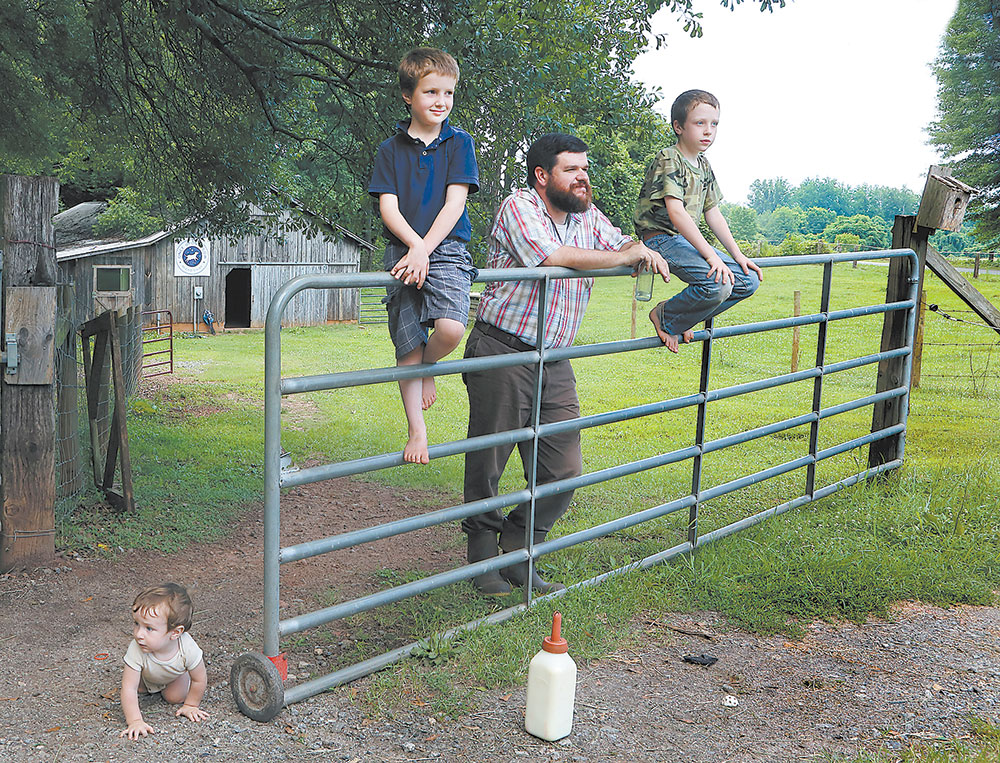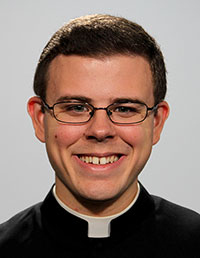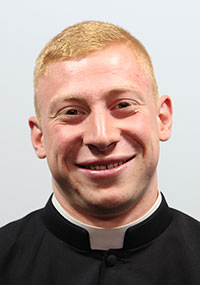Work, prayer, family, faith Jason Craig and his sons take a break from their work on St. Joseph’s Farm. The Craig family combines their Catholic faith and their farming under the motto “work, pray, rest,” echoing the Benedictine order’s motto “ora et labora” (“work and prayer”). (Photos by Giuliana Polinari Riley)
Jason Craig and his sons take a break from their work on St. Joseph’s Farm. The Craig family combines their Catholic faith and their farming under the motto “work, pray, rest,” echoing the Benedictine order’s motto “ora et labora” (“work and prayer”). (Photos by Giuliana Polinari Riley)
COLUMBUS — Wide stretches of farmland and long rows of wooden fences are common in rural Polk County. It’s easy to overlook one special farm out here, especially since there is no sign, no distinguishing landmark along the roadside.
But St. Joseph’s Farm is sacred ground to couple Jason and Katie Craig and their six children, and it is becoming a popular retreat spot for Catholic men and boys seeking to grow closer to Christ.
The Craigs work the soil of St. Joseph’s Farm in the Benedictine spirit while hosting retreats, homeschooling, praising the Lord and maintaining a Grade A micro dairy. The 10-acre farm off Melvin Hill Road is a real working farm – vegetables, herbs, chickens, pigs and dairy cows are all cultivated here.
“And kids!” the Craigs’ daughter Margaret Mary chimes in.
The Craig children run around the property climbing trees and playing on a swing while Jason picks string beans, describes the rotational grazing concept of the chicken coops, and shows the inner workings of the milking machine. The pigs are for the retreats, the vegetables, eggs and chickens for food, and the cows for dairy products.
Says Katie, “If you want to eat, somebody has to do the work.”
The Craigs homeschool their children and make an income through farming, retreats and writing. Jason smiles, “Yes, we are here to farm. I don’t think everybody should be farmers, but I think a lot more of us should, but not because it is a good way to make money.”
Jason and Katie were not raised Catholic, Jason explains as he hands over a baby kitten to his 3-year-old son Joseph.
“We are both converts. I was a Calvinist and my wife grew up atheist. We both became Christians in high school. First Protestants, and then Catholics in our early 20s. We were in RCIA and entered the Church together. We received four sacraments within two months – confession, confirmation, Holy Communion, and matrimony. It was a whirlwind of grace.”
Just as with their faith, they came to the farming life as adults.
“We did not grow up farming, “Jason says. “I do have a degree in horticulture and did work in landscape design for a while, but not farming. We’ve had farming mentors, but we had to figure out how to milk cows and kill pigs. Neither one of us knew farming.”
They combine their faith and their farming under the motto “work, pray, rest” – echoing the Benedictine order’s motto “ora et labora” (“work and prayer”).
“We added ‘rest’ as a reminder in such a busy and hectic world that God made us to rest in Him,” Jason says.
The Craigs start each day with a prayer and a meal together, and then they milk the cows, do some schoolwork, rest, then pray and work some more.
During rest times, Margaret Mary says her favorite thing to do is to wander off into the woods. The younger boys play with the kittens.
Behind their house, Jason’s office features nine feet of neatly shelved books on Catholicism. There’s a rolling library ladder so “The Lives of the Saints” can be reached on the top shelf.
Going inside, Jason glances at the books as he explains, “The Rule of St. Benedict inspires a rhythm of work and prayer, and you can almost see them as one when cultivating the soil and cultivating the soul. St. Paul says to pray without ceasing, but we can’t just stay in the chapel all day, because we need food. That is part of being man. St. Isadore, Adam, Eve, Cain, Abel, Abraham, Noah were all farmers. Farming is the original vocation of all men. The Benedictines, when they say ‘work and pray,’ what they originally meant was ‘farm and pray’ because you need to eat. Culture grows from ‘the fruit of the earth and the work of human hands,’ like we hear at Mass. Even to say Mass, you need farmers. People have to grow grapes and people have to grow wheat.”
Jason, with a master’s degree from The Augustine Institute and Katie with a degree of her own, could easily go into other work and be “successful.” But they traded the lifestyle valued by contemporary culture for a lifestyle centered around the traditional values of home.
“Farming has something to teach us within itself,” Jason says. “Part of the reason we are doing this farm is because American families are so detached from their homes. Homes are where we sleep and maybe eat but don’t serve a function in our economic life, which is what makes them truly functional. The goal with our homestead is to functionalize the home. We made the home not only a place to be together, but to do together. The retreats and the farming, we do together. The homeschooling makes the home function as a schoolhouse. It is part of the philosophical approach of turning a house into a household. The household is a place where there is a whole bunch of things happening, including economics and education. Everyone has a moment at some point when they think, ‘I need simplicity, things have gotten loud and complicated,’ and we go back naturally to the soil from where we came from.”
Jason warns, “Farming is basic to human culture, but we are disconnecting from it and we don’t learn those needed lessons. It becomes hard even to grasp the meaning of some of the parables. What do seeds thrown on bad soil look like? Why does God have to prune us? One to two generations ago, we were all barely removed from the farm, if removed at all. An overwhelming majority of man throughout time has had a connection with farming up until, really, us. We are kind of an experiment. What will we be like when we are not connected to farming and the earth, sealed off away from nature? There is going to be an effect when we have no understanding how these things work, because God created the natural world so as to communicate Himself to us. We are so disconnected from the land, and it is going to matter.”
The search for God through family, household and farming was initially what brought the Craigs into this Benedictine lifestyle. Jason’s concerns about masculine identity in contemporary society led him directly to agriculture.
He explains, “The primary reason I did this was because I was studying for my master’s and I was looking into what happened to families. Particularly men, why is there such a deficit of fruitful Catholic men? Part of it has to do with economics – men are not connected to the home by their work, but driven away from it.”
One of the Craigs’ missions through the farm is to raise up strong Catholic men, and not just their own boys. Through the Fraternus organization, the Craigs are able to share their apostolate with fellow Catholics. Local chapters include St. Ann in Charlotte, St. Michael in Gastonia, and St. Mark in Huntersville.
Jason describes, “As boys leave boyhood behind and become adolescents and eventually become men, they need to be instructed by men. If they don’t have a father, they need fatherly mentors. All boys need male mentors and fathers. There are so many boys without spiritually mature fathers. A mother can give everything, but she can’t give masculinity, because she can’t give you something she doesn’t have. Fraternus exists because boys are leaving the faith, because they do not have a spiritually strong man in their life. It is getting worse and worse.”
During the weekend retreats at St. Joseph’s Farm, men and boys typically become bonded in an experience of prayer, work and brotherhood. Craig centers the retreat around harvesting a pig for food.
“It is particularly fruitful to recalibrate and gain a sense of silence, a sense of wonder, a sense of God,” he explains. “We are not sending people back to Charlotte to start a farm. But there is something that happens when you see a bullet go into a pig’s forehead. When you kill that pig, everything changes. That adolescent wakes up and gets out of the funk he was in. Everything goes down to the nitty-gritty of life and it happens very quickly. It is shocking, but it is good to learn that life comes from death. When you hear ‘Behold the Lamb of God who takes away the sins of the world,’ you are not supposed to think ‘Jesus is really cute as a little lamb,’ but about His sacrifice, about the Passion. To see an animal die to allow you to live, you don’t need to delight in it or even enjoy it, but in the end, you will gain an appreciation for it. Just like in Mass, there is a reality of sacrifice and thanksgiving in every meal.”
— Lisa Geraci, Correspondent
More online
At www.stjosephsfarm.com: Learn more about retreats at St. Joseph’s Farm or Jason Craig’s book “Leaving Boyhood Behind.”
CHARLOTTE — Two more graduates from St. Joseph College Seminary will begin formal studies towards priestly formation at Mount St. Mary’s Seminary at the Athenaeum in Cincinnati, Ohio, this fall.
Seminarians Christopher Brock and Peter Rusciolelli are the second set of seminarians to graduate since the college seminary was founded in 2016.
“I am very excited for my transition to major seminary,” Brock said. “I have heard many good things from my brother seminarians who have completed their first year at the Athenaeum, and I am excited to go and join them.”
 Brock“I am looking forward to moving into my theology studies because it is a large step closer to my ordination as a priest,” said Rusciolelli. “It is exciting to see the reality come closer and closer so dramatically, as it will only continue to do so over the next couple of years. I look forward to going through candidacy, being installed as a lector and acolyte, ordained a transitional deacon – all for the end of following Our Lord’s call and, God willing, being ordained a priest.”
Brock“I am looking forward to moving into my theology studies because it is a large step closer to my ordination as a priest,” said Rusciolelli. “It is exciting to see the reality come closer and closer so dramatically, as it will only continue to do so over the next couple of years. I look forward to going through candidacy, being installed as a lector and acolyte, ordained a transitional deacon – all for the end of following Our Lord’s call and, God willing, being ordained a priest.”
Both say the college seminary experience has been vital in preparing them for continued formation towards the priesthood.
“My time in college seminary has been instrumental in helping me to build character and grow in virtue, as well as recognize where my weaknesses are,” Brock said. “Academically, the education in philosophy I got in college seminary should provide me with the background and tools that I need to study theology.”
“Most importantly,” he added, “the spiritual formation I had in college seminary has helped me to develop good habits in my spiritual life, habits that I will need both as a seminarian and, God willing, as a priest one day.”
Rusciolelli said his time at St. Joseph College Seminary also helped him grow closer to Jesus, seeking His will above all else, and understanding that if we aren’t doing what He asks of us with complete trust and confidence in Him, we are “a resounding gong.”
‘All our efforts and all our successes must be through and for Him lest everything we do be a waste,” he said. “SJCS has helped me understand this.”
Formators at the college seminary have emphasized cultivating virtue, developing a prayer life, and becoming familiar with Church teachings, philosophy and Latin as building blocks towards their continued discernment of the priesthood and the goal of becoming a faithful priest who will serve the people of the diocese.
 Rusciolelli“All the little daily practices in the college seminary schedule are directed at this end of building a strong and healthy foundation of a man,” Rusciolelli said, “capable of supporting a structure which rises high up towards heaven and bringing others with it.”
Rusciolelli“All the little daily practices in the college seminary schedule are directed at this end of building a strong and healthy foundation of a man,” Rusciolelli said, “capable of supporting a structure which rises high up towards heaven and bringing others with it.”
— SueAnn Howell, Senior reporter
 CHARLOTTE — Father Richard Sutter has been appointed pastor at St. Gabriel Church in Charlotte after Father Frank O'Rourke recently announced his retirement.
CHARLOTTE — Father Richard Sutter has been appointed pastor at St. Gabriel Church in Charlotte after Father Frank O'Rourke recently announced his retirement.
Father Sutter has served as served as parochial administrator at St. John the Evangelist Parish in Waynesville and Immaculate Conception Mission in Canton since 2018.
Father Sutter is a 1991 graduate of Belmont Abbey College. He served in the U.S. Army before entering the seminary and was ordained to the priesthood in 2009.
Father Sutter served as chaplain of Christian Brothers' School in New Orleans, chaplain of Acadian Oaks Catholic Youth Retreat Center in Lafayette and Conquest Boys Club Youth Section Director for the state of Louisiana.
He moved to the Archdiocese of Atlanta in 2011, where for three years he served as chaplain at Pinecrest Academy High School and five years as the Catholic chaplain for the Atlanta Braves.
Father Sutter's cousin is a priest with the Savannah diocese, so in 2014 he asked to discern some time there where he served from 2014 to 2016 as chaplain of Aquinas High School in Augusta, Ga.
In 2016, Father Sutter spent several months of discernment at Belmont Abbey, during which time he said he sensed a call to serve in the Charlotte diocese.
He was in residence at St. Patrick Cathedral prior to serving the Waynesville parish. Father Sutter will be one of the Teen Track speakers at the upcoming Eucharistic Congress Sept. 7.
Father O'Rourke was ordained by the late Bishop Michael J. Begley, the first bishop of the Diocese of Charlotte, at St. Ann Church for the Feast of Christ the King Sunday, Nov. 23, 1975. He is one of the first 10 priests ordained to serve the Charlotte diocese since it was established Jan. 12, 1972.
— Catholic News Herald
CHARLOTTE — The Diocese of Charlotte is supporting a request from Charlotte-area media to unseal documents in two civil lawsuits dismissed in 2014.
Media outlets WBTV, WSOC, WCNC and The Charlotte Observer filed two motions July 19 in Mecklenburg County Superior Court to open the files, which the diocese said had been sealed at the plaintiffs’ request to protect their identities.
The court has yet to consider the motions.
A July 22 statement from the diocese read, in part, “The diocese supports the media’s request to unseal documents in the civil suits – if that is the desire of the plaintiffs involved. In fact, the only information that the diocese filed under seal in these cases is information that would reveal the plaintiffs’ identities, a step the diocese took to honor the plaintiffs’ request at the time. Respecting the wishes of plaintiffs in this case and promoting healing for all victims of abuse remain our highest priorities.”
The statement continued, “The Diocese of Charlotte is committed to transparency, accountability and compassion for victims of sexual abuse, and has embraced the protections and reporting requirements spelled out in 2002 by the U.S. Conference of Catholic Bishops’ Charter for the Protection of Children and Young People. We do not tolerate child sexual abuse, and the diocese acts swiftly to report allegations to authorities, cooperate with law enforcement, and discipline clergy found to have credible allegations against them.”
— Catholic News Herald





















